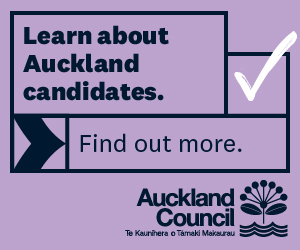
Auckland Council

Freshwater
The worsening state of New Zealand’s lakes and rivers is a major challenge for regional councils, which play a leading role in managing freshwater in their areas. To this end, regional councils create plans to protect water resources from contaminants and overuse.

Freshwater
The worsening state of New Zealand’s lakes and rivers is a major challenge for regional councils, which play a leading role in managing freshwater in their areas. To this end, regional councils create plans to protect water resources from contaminants and overuse.
Ensure antiquated infrastructure be updated, especially where there are issues of people's health.
Although our area has few primary producers, where they are present give them adequate protection from policies that work against them.
Guarantee the principle of water remaining a property of the people of NZ and that it not be sold off to powerful interest groups.
Oppose government's undemocratic Three Waters scheme, which will expropriate Auckland's publicly funded water infrastructure, dams.
Ensure timely completion of the central interceptor to reduce ongoing pollution of our streams and harbours by sewage contaminated stormwater.
Clean and filter the city's street catchpits which were designed to reduce harbour pollution but in the present neglected state exacerbate it.
Remove the requirement for a paid freshwater fishing licence, for anglers and spearfishers targeting non-trout species, eg perch and carp.
Promote evidence-based riparian buffers. Note: Sheridan, Lowrance and Bosch 1999; Lyons 2000; Karssies and Prosser 1999; McKergow 2004.
Raise awareness on terrestrial agriculture contribution to sedimentation. Support increasing local utilisation of local marine protein.
Committed to protecting and enhancing te mauri o te wai, the life sustaining capacity of water by giving effect to Auckland's Water Strategy.
Continue the work to update Auckland's drought management plan to guide how Watercare and council respond effectively to drought events.
Continue funding community-led ecological restoration and riparian planting to restore our waterways.
Ensure antiquated infrastructure be updated, especially where there are issues of people's health.
Although our area has few primary producers, where they are present give them adequate protection from policies that work against them.
Guarantee the principle of water remaining a property of the people of NZ and that it not be sold off to powerful interest groups.
Oppose government's undemocratic Three Waters scheme, which will expropriate Auckland's publicly funded water infrastructure, dams.
Ensure timely completion of the central interceptor to reduce ongoing pollution of our streams and harbours by sewage contaminated stormwater.
Clean and filter the city's street catchpits which were designed to reduce harbour pollution but in the present neglected state exacerbate it.
Remove the requirement for a paid freshwater fishing licence, for anglers and spearfishers targeting non-trout species, eg perch and carp.
Promote evidence-based riparian buffers. Note: Sheridan, Lowrance and Bosch 1999; Lyons 2000; Karssies and Prosser 1999; McKergow 2004.
Raise awareness on terrestrial agriculture contribution to sedimentation. Support increasing local utilisation of local marine protein.
Committed to protecting and enhancing te mauri o te wai, the life sustaining capacity of water by giving effect to Auckland's Water Strategy.
Continue the work to update Auckland's drought management plan to guide how Watercare and council respond effectively to drought events.
Continue funding community-led ecological restoration and riparian planting to restore our waterways.
Mayor
Compare the mayoral candidates in your area
Local council
Compare the candidates for your city or district council
Regional council
Compare the candidates for your regional council
Local board
Compare the candidates for your local or community board










